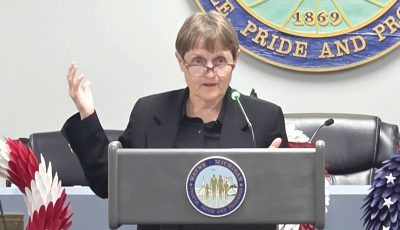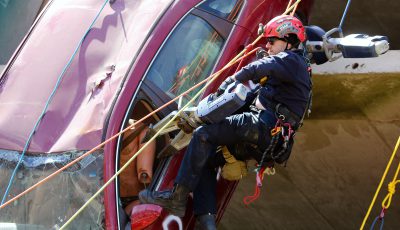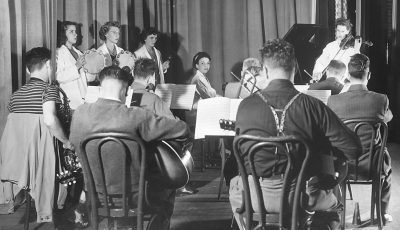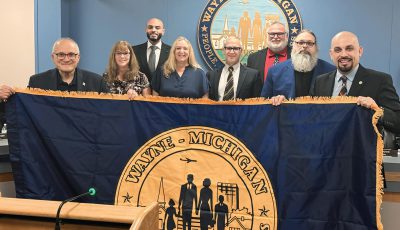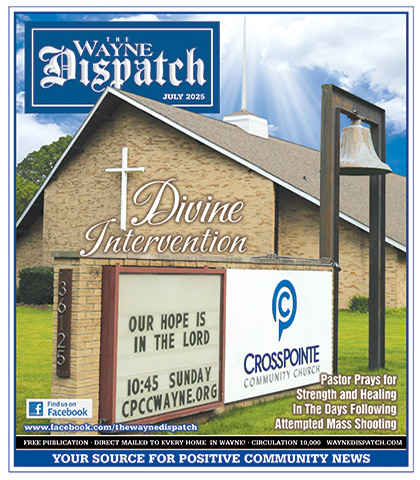Mission trip moves Rotarian
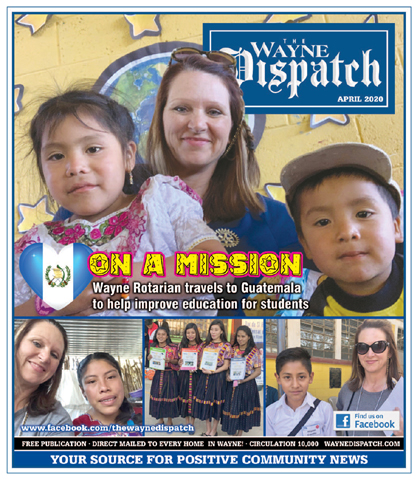 By Carolyn Marnon – She lays the items out on her desk. A hand-stitched weaving. A piece of cloth that has extensive hand-stitching on it bought for approximately $30 US dollars. An apron with hand-stitching on it to add to her apron collection. A beautiful hand-stitched table runner. A hand-beaded sunflower bracelet. A hand-beaded hummingbird dangle. She is dazzled by the handiwork of each item and how beautiful each item is. These are the treasures that Wayne Rotary member Trish Hampton brought back from her mission trip to Guatemala in February.
By Carolyn Marnon – She lays the items out on her desk. A hand-stitched weaving. A piece of cloth that has extensive hand-stitching on it bought for approximately $30 US dollars. An apron with hand-stitching on it to add to her apron collection. A beautiful hand-stitched table runner. A hand-beaded sunflower bracelet. A hand-beaded hummingbird dangle. She is dazzled by the handiwork of each item and how beautiful each item is. These are the treasures that Wayne Rotary member Trish Hampton brought back from her mission trip to Guatemala in February.
Trish, a sales representative at Mark Chevrolet in Wayne, says she has always wanted to do a mission trip. She was turning 50 in January and decided now was the time to make that special mission trip. With the Wayne Rotary Club sponsoring her trip, she turned a half-century on January 29 and was on a plane to Guatemala on February 1.
Why Guatemala? A network of Rotarians improving education for underserved students in Guatemala make up the Guatemala Literacy Project (GLP), the group that put together this particular mission trip. Trish says she was joined by about 22 other people who came from Michigan, California, Colorado and Florida, none of whom she knew.
GLP was formed when co-founder Joe Berninger’s brother went to teach in Guatemala and found that the kids there didn’t have any books. The GLP website shares that 90% of Guatemala’s poor kids never graduate from high school, 79% of indigenous Guatemalans live in poverty, and 33% of indigenous adults cannot read or write. “Together, these factors virtually guarantee that the next generation will be no better off than the last.” The website goes on to say that “Teachers in rural schools often lack formal training and the resources—such as books and computers—that they need to facilitate learning.”
GLP finds people to sponsor students, classrooms, textbooks and other needs. Trish says that each year, families involved in GLP in Guatemala give $1 for the textbook they use that year. By the time new textbooks are needed, GLP has accrued the funds to provide a new book.
Trish was so impressed with what she learned and her entire trip that she has decided she wants to save her money to go on another trip next year. She explains that when you see all that she saw, it makes you want to help as much as you can.
When she arrived in Guatemala, she had to take a taxi from the airport to her destination. She shared her licorice with the driver who didn’t speak English. She was flabbergasted when they pulled alongside a big truck with an open back end that held an assortment of cows, pigs and chickens. Not what you would see driving down the road in this area.
While visiting churches and schools, Trish was moved emotionally by several incidents. The first was a visit to a student. Trish’s group had been invited to the student’s home on a mountain. The bus dropped the group off at the base of the mountain. They had to hike up the mountain to get to the girl’s home. She says they passed by corn crops, chickens running loose, and raspberry bushes on their way up. Once at the girl’s home, they were welcomed by the family, who had laid out a large area with pine needles on the ground so their guest’s shoes wouldn’t get dirty since there was dirt everywhere else. Trish says they sat on 2 x 4s. The home was made with cornstalks. The student’s father had quit school at 3rd grade. Her mother had made it through 6th grade. When the father got sick, the student, who is in 6th grade now, had to go to work to make money for her family. The family didn’t have beds. They slept on the floor. The GLP group brought them rollaway mattresses.
The son of this family also lived on the mountain. He picked tomatoes for a living. The families got their water at a ravine where there was a box around it. Trish was fairly confident the water was not clean. Members of the group had been told not to drink any water unless it was bottled water that was provided to them and to eat nothing that could not be peeled.
At the 5-6 schools the group visited, Trish says the students lined up to receive them “hootin’ and hollerin’ and clapping. They were so excited we were there.” The kids performed ritual dances for the group. These included dances to make it rain and for crops to grow.
Before she left Wayne, Trish says members of the WMHS Interact Club, a part of Rotary for high school students, made bracelets for her to take and give out to the children. She also took stickers, bubbles, Rotarian soccer balls, and a polaroid camera to hand out pictures. At each school, the group gave a projector, books, soccer balls, pencils and erasers.
The other moment that moved Trish was when she was visiting a 3rd and 4th grade classroom. She gave out bubbles and stickers to the students. She says three little girls sat next to her and took turns reading to her. One girl could read well in Spanish while another one struggled, sounding out the words slowly. During this time, Trish says she closed her eyes, her mind went blank and then all she heard was the sound of children reading throughout the classroom. She realized because of GLP, these kids were reading.
Trish recalled a visit to a church where many Guatemalans are old-school Catholic. She observed a woman who appeared to be about 70 years old praying on her knees. She would “walk” on her knees to the altar and then back away from it on her knees. Trish was told the woman was offering a sacrifice because a prayer had been answered for her.
On the last day in Guatemala, the group visited an upper class. Guatemalans are done with school at 6th grade when they then decide what they want to do for a living. They then start riding school buses, called chicken buses there, to different high schools based on what they want to do.
In downtown Guatemala, Trish observed that everyone dresses much the same as we do. It is in the rural areas where the dress is more traditional. In those areas, kids take turns bringing chalk to school to be used on the chalkboard.
There are many challenges for the people of rural Guatemala: dire poverty, the pressure to marry or have children at an early age, alcohol or abuse in homes, the gang culture, lack of family support and the belief that education is not worth investing in. Teachers have to be trained on how to use textbooks.
As a result of her mission trip, Trish has brought back information to share with the Wayne Rotary about sponsoring a child. Sponsors can email with the student, visit the student and help pay for books, mentors, psychologists, social workers, job skills and social justice workshops to give a student a step up and perhaps start reversing the trend so their family can get out of poverty for future generations.



